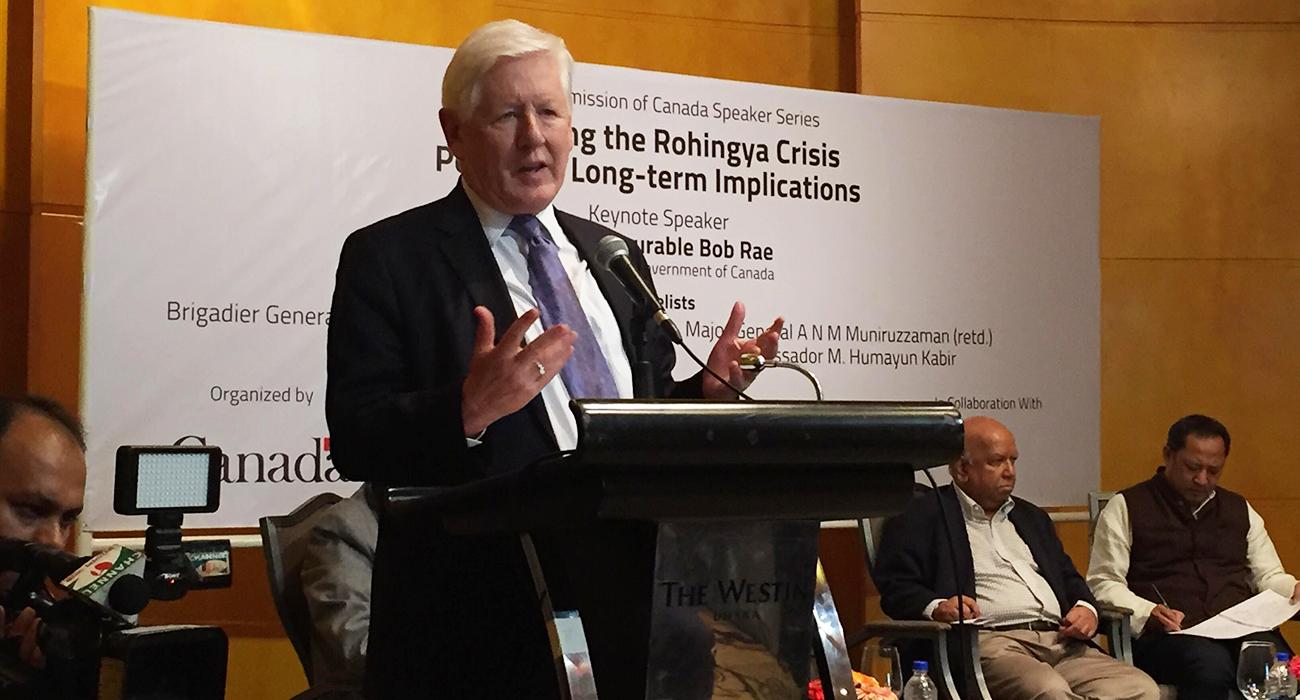Canada suggests transitional plan for Rohingyas

Canadian Prime Minister’s special envoy to Myanmar Bob Rae suggested a transitional plan for Rohingyas living in Bangladesh before they are sent to their homeland in Rakhine State
“Not short or long-term, we need to make a transitional plan for the Rohingyas,” he said emphasising on education and income-generating activities for the Rohingyas keeping the ongoing efforts for repatriation unhindered.
Bob Rae said those responsible for the atrocities against the Rohingya must face accountability and noted that the process has progressed which will have to continue.
He made the remarks while speaking at a panel discussion on potential long-term implication of Rohingya crisis jointly organised by Canadian High Commission in Bangladesh and Reading Club Trust in a city hotel.
State Minister for Foreign Affairs Shahriar Alam, Canadian High Commissioner to Bangladesh Benoit Prefontaine, former Ambassador Humayun Kabir, Brig Gen (retd) Sakhawat Hussain, Chakma Raja Debashish Roy and security analyst Maj Gen (retd) ANM Muniruzzaman, among others, spoke at the programme.
Diplomats, academics, students and civil society members attended it moderated by DU Professor Syed Munir Khasru.
The launch of a new appeal for the humanitarian situation in Bangladesh -- the 2019 Joint Response Plan - will take place soon which seeks to raise some $920 million to continue meeting the basic needs of Rohingyas and the communities hosting them.
The Canadian special envoy fears that the Rohingyas might get engaged in crimes and radicalisation if they do not get education and jobs.
State Minister Shahriar Alam, however, called for international community's continuous pressure on Myanmar for Rohingya repatriation.
He said Asean has assured Bangladesh of extending its cooperation in solving the crisis, something that is very positive.
Bob Rae said it is a heavy burden and a political challenge for Bangladesh to provide humanitarian assistance to over a million Rohingyas, including some 750,000 who fled military atrocities since August 2017.
He said there has to be transitional plan for the Rohingya, which include providing education and jobs and any development assistance has to be directed at both the host community and Rohingya in Cox's Bazar and beyond.
Muniruzzaman said a number of security threats - drugs, arms and sex trafficking, as well as radicalisation of the Rohingya- have been identified concerning the Rohingyas.
"Unless the crisis is addressed properly, the threats could be real and could spread in the region," he said, suggesting rigorous security assessments and taking measures accordingly.
Chakma Raja Debashish Roy said settlement of Bangalees in the Chittagong Hill Tracts in the 1980s had created serious problems.
Therefore, any settlement of the Rohingya in the CHT would hamper peace there, he added.
Former Ambassador Humayun Kabir said the international community must come forward to address these concerns and help Bangladesh.
China could be a key player in helping address the crisis, and there must be some other countries to convince China to play the role, he added.
Sakhawat Hussain suggested more engagement with Myanmar, including at the civil society, academia and the retired military officials for building mutual trust.
